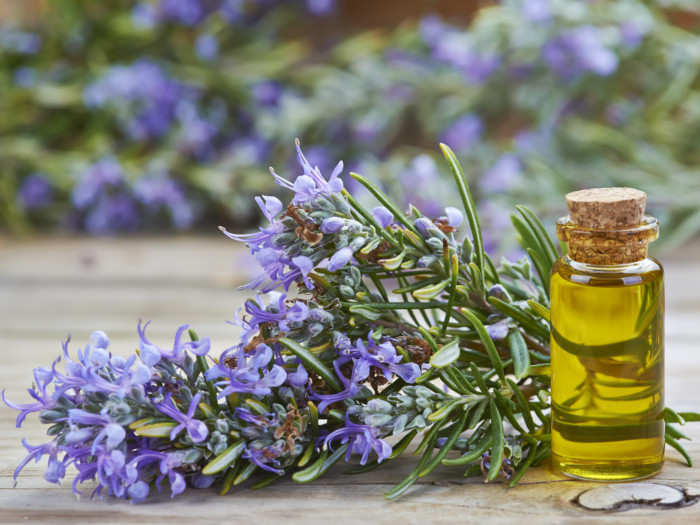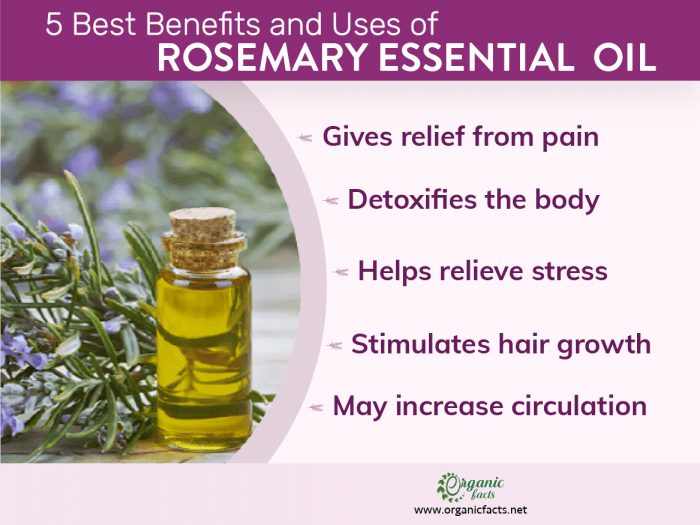Rosemary is one of our most prized herbs. It was held in reverence by the ancient Romans, Egyptians, and Greeks. The use of rosemary oil also goes back centuries. Our love for this herb and its essential oil has continued through the ages. It is one of the most popular essential oils in aromatherapy.
What is Rosemary Oil?
Extracted from the herb Rosmarinus officinalis, rosemary oil is popular in aromatherapy. Among other benefits, it is good for hair, skin, and may help in improving memory. It belongs to the mint family, which includes basil, lavender, peppermint, and sage.
Rosemary has always held a special place in Western civilizations. It was used for wedding ceremonies, food preparations, cosmetics, and medicinal herbal products. Among the first people who documented its benefits was Paracelsus, the renowned German-Swiss physician, and botanist during the 16th century. Paracelsus valued its essential oil because of its ability to strengthen the entire body. He believed that the oil had the ability to heal delicate organs such as the liver, brain, and heart.
It’s easy to make this oil at home. Learn How To Make Rosemary Oil with our DIY recipe. But be careful when using it. Like other essential oils, it is in a highly concentrated form.
Health Benefits of Rosemary Oil
Today, many medicinal preparations contain rosemary essential oil. Its many well-researched health benefits are listed below:
For Haircare
Regular use of rosemary oil can help stimulate follicles, making hair grow longer and stronger. It may also help slow down premature graying and hair loss. According to a report in the Skin Med Journal, the oil helps in increasing hair count. The study found that volunteers, suffering from severe hair fall, saw a significant improvement after applying the oil for just six months. Regular massaging of the scalp with rosemary oil nourishes the scalp and removes dandruff. [1]
Find out more about how to use it in our article on Amazing Benefits of Rosemary Oil for Hair.
Skincare
While it is not used in skincare as extensively as it is used in hair care, rosemary oil has potent antimicrobial and antiseptic qualities that can help you deal with eczema, dermatitis, oily skin, and acne. Topical application or massage with the oil helps in toning the skin and removing dryness. A study found that the essential oil, when regularly added to a moisturizer or face creams, showed a significant improvement in skin hydration and elasticity. [2]
It is advised to dilute the oil with a carrier oil before applying it to the skin. As a concentrated oil, it is quite strong, and direct application is more likely to trigger an adverse reaction. You can simply add a few drops to your moisturizer, body lotion, or face cream in your daily skincare routine. You can also add it to carrier oils like coconut or olive oil.
Improves Cognitive Function
Rosemary has traditionally been associated with memory and remembrance. Science is now revealing that there is a strong truth in this association. One study found that both cognitive performance and mood improved with exposure to the essential oil. Higher concentration improved results. Not just that, the test showed significant improvements in speed and accuracy. Another study with school children found similar results. Participants exposed to the oil showed improvement in short-term memory. Researchers are now focusing on using rosemary essential oil as a therapeutic aid for cognitive disorders like Alzheimer’s disease. [3] [4] [5]

Rosemary plant with rosemary oil Photo Credit: Shutterstock
Relieving Stress
Feeling stressed? A few drops of the oil in your infuser or aromatherapy diffuser may help you relieve your stress and leave you active and energized. A study, published in the Psychiatry Research journal found that inhaling a combination of rosemary oil and lavender oil for five minutes significantly reduced the levels of cortisol (our stress hormone) in the saliva.
In fact, it is often used in aromatherapy to lift one’s mood. In a study, published in Scientia Pharmaceutica volunteers reported feeling more active and fresh after inhalation treatment with rosemary oil. Scans showed that their brain wave and autonomic nervous system activity increased post-inhalation. [6] [7]
Boosts Immune System
A simultaneous massage and inhalation of rosemary essential oil could improve your immunity. This could be because it raises cortisol levels, which protect the body from oxidative stress A 2017 study, published in the journal Cogent Biology, found that a blend of essential oils, which included rosemary oil, boosted the body’s anti-inflammatory and immune-modulating responses. So, regular use or inhalation of the oil in aromatherapy sessions may aid in strengthening your immune system. [8] [9]
Relieves Pain
Rosemary oil showed strong potential in relieving pain in different studies. In a South Korean study, stroke survivors with shoulder pain experienced a 30 percent reduction in pain after the administration of acupressure with blended oils that included rosemary oil. Another study suggests that the oil has anti-inflammatory properties and may help relieve pain. It is used in aromatherapy to provide relief from headaches, muscle pains, rheumatism, and even arthritis. [10] [11]
Other Benefits:
There are other benefits associated with the use of rosemary oil, such as:
Digestive aid: Rosemary oil is sometimes used in aromatherapy for curing indigestion, constipation, and colitis, Lab tests have shown that it could inhibit the growth of multiple-drug resistant E. coli bacteria. But do keep in mind that it should never be ingested. [12] [13]
Detox: Research shows that rosemary essential oil detoxifies the liver, whilst helping in the regulation, creation, and release of bile, which is a key part of the digestive process. It can eliminate free radicals from the body, protecting the liver against damage. [14] [15]
Oral care: Multiple studies have shown that rosemary can be very beneficial for our dental health. The antimicrobial properties of its essential oil are effective in dealing with oral pathogens. One study found that toothpaste containing rosemary extract was effective in treating gingival bleeding and reducing bacterial plaque. However, do keep in mind that essential oils should never be taken orally. Talk to a dentist on the correct way of administrating essential oil for dental care. [16] [17]
Prevent Herpes: Studies have shown that rosemary oil shows antiviral potential against Herpes simplex virus-1 which can cause lifelong infections. A study, published in the Journal of Acute Medicine, found that a blended oil, which contained the oil, was effective in inhibiting the virus. [18]
Improve blood circulation: A rosemary oil massage can help warm the body. It can improve blood circulation and provide pain relief. One study revealed that the oil blend was more effective than conventional medicine in warming the limbs of a patient suffering from Raynaud’s disease. [19] [20]

Rosemary oil is extracted from the popular herb Rosmarinus officinalis. It is very popular in the Mediterranean region as a culinary herb.
Rosemary Oil Uses
There are many ways you can use rosemary oil. It is colorless with a pleasant herbal aroma. You can use it for aromatherapy or apply it to your hair/skin. To apply topically, dilute it with a carrier oil. Here are a few things you can use it for:
For Hair
You can add rosemary essential oil along with carrier oils like coconut and jojoba and apply it to your hair. Look for natural products that contain rosemary oil. You can add it to hair masks, shampoos, and hair conditioners. You can make a hair mask by adding it to carrier oils like coconut or olive oil with a little honey. The easiest way to use rosemary oil is to simply add a few drops to our regular shampoo or conditioner.
For Skin
When buying natural skincare products, make sure they contain rosemary oil. Alternatively, add a few drops to your moisturizer or face cream and give them a mix. For a more natural skincare alternative, add a drop of rosemary oil to 1 teaspoon of coconut or olive oil and apply on the skin. Do not apply rosemary oil directly as it is quite strong.
Massage
Make your own massage blend with rosemary, thyme, and lemongrass essential oils. You can add this with a carrier oil like coconut or jojoba. The pleasant aroma is also invigorating in nature.
In aromatherapy
Rosemary oil is used in aromatherapy to prompt alertness and boost the mood. You can add rosemary oil to your infuser or diffuser, by itself or with any other oil of your choice, such as pine essential oil or lemongrass essential oil.
For Pest Control
Rosemary oil is effective against pests like ants and spiders. You can make a spray with a blend of other essential oils, such as peppermint and marigold essential oils. Mix this blend in a gallon of water and a teaspoon of liquid soap. Pour into a spray bottle for easy use.
How to Dilute Rosemary Oil?
As mentioned above, rosemary oil should never be applied directly. You must dilute it before application. To dilute, use it with a carrier oil like jojoba, olive, hemp, or coconut oil.
Where to Buy Rosemary Oil?
You can buy rosemary oil in nearly every whole food and health store, in addition to large big-box chains like Walmart and Target. However, one should always request a GC-MS report to confirm the oil is high-quality and free of adulterations. Rosemary is one of the most popular herbs, and its oil enjoys similar fame all over the world. There are different types, chemotypes (the oils with different dominant chemical constituents; e.g. 1,8-cineole CT, verbenone CT, and camphor CT), and strengths of the oil, so do your research well before buying.
Side-Effects
Like any other essential oil, rosemary oil should also be used with care. It should never be applied directly to the skin. Essential oils are in a concentrated form and direct application can trigger adverse reactions in the skin. It is best to talk to a reputed herbalist before you use it. While it has shown many health benefits in different clinical trials, we strongly advise you to talk to your doctor before using it as an alternative treatment method.
- Allergy: Rosemary essential oil may cause allergic reactions, so it should only be used if prescribed or after thorough consultation with your medical specialist. Always do a patch test before applying it topically with a carrier oil.
- Nausea: Since rosemary oil is volatile in nature, the oil occasionally causes vomiting and spasms. Therefore, it is advisable to exercise caution while ingesting it.
- Pregnancy: It is strongly suggested that rosemary essential oil should not be used by pregnant, breastfeeding or nursing women. Excessive use of the oil may even lead to miscarriage or disability in the fetus. [21]
- Orally: It can be toxic if taken orally. [22]
